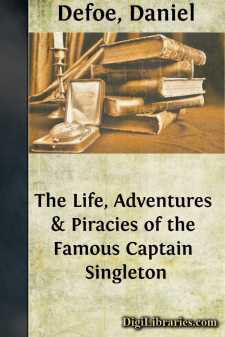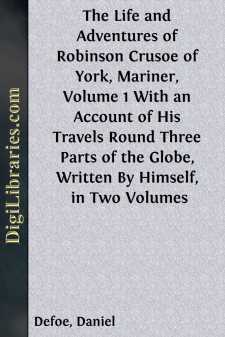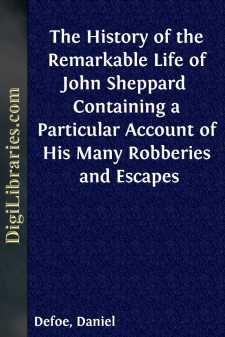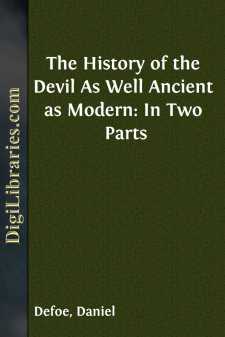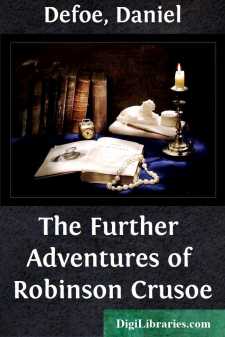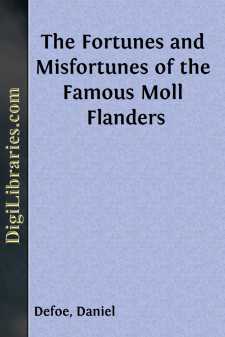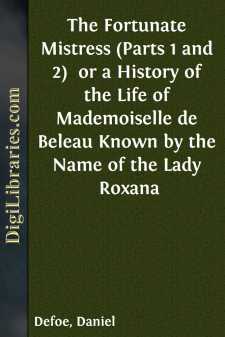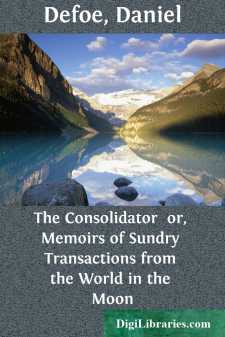Categories
- Antiques & Collectibles 13
- Architecture 36
- Art 48
- Bibles 22
- Biography & Autobiography 813
- Body, Mind & Spirit 142
- Business & Economics 28
- Children's Books 14
- Children's Fiction 11
- Computers 4
- Cooking 94
- Crafts & Hobbies 4
- Drama 346
- Education 46
- Family & Relationships 57
- Fiction 11829
- Games 19
- Gardening 17
- Health & Fitness 34
- History 1377
- House & Home 1
- Humor 147
- Juvenile Fiction 1873
- Juvenile Nonfiction 202
- Language Arts & Disciplines 88
- Law 16
- Literary Collections 686
- Literary Criticism 179
- Mathematics 13
- Medical 41
- Music 40
- Nature 179
- Non-Classifiable 1768
- Performing Arts 7
- Periodicals 1453
- Philosophy 64
- Photography 2
- Poetry 896
- Political Science 203
- Psychology 42
- Reference 154
- Religion 513
- Science 126
- Self-Help 84
- Social Science 81
- Sports & Recreation 34
- Study Aids 3
- Technology & Engineering 59
- Transportation 23
- Travel 463
- True Crime 29
Daniel Defoe
Daniel Defoe (1660-1731) was an English writer, journalist, and pamphleteer, best known for his novel "Robinson Crusoe," which is considered one of the first novels in the English language. His diverse body of work includes adventure stories, political treatises, and economic tracts, reflecting his varied career and interests. Defoe's writing style and themes have had a significant impact on the development of the modern novel and journalism.
Author's Books:
Sort by:
by:
Daniel Defoe
It is not that I see any reason to alter my opinion in any thing I have writ, which occasions this epistle; but I find it necessary for the satisfaction of some persons of honour, as well as wit, to pass a short explication upon it; and tell the world what I mean, or rather, what I do not mean, in some things wherein I find I am liable to be misunderstood. I confess myself something surpris'd to...
more...
by:
Daniel Defoe
PREFACE That all Defoe's novels, with the exception of "Robinson Crusoe," should have been covered with the dust of neglect for many generations, is a plain proof of how much fashions in taste affect the popularity of the British classics. It is true that three generations or so ago, Defoe's works were edited by both Sir Walter Scott and Hazlitt, and that this masterly piece of...
more...
by:
Daniel Defoe
THE LIFE OF Daniel De Foe was descended from a respectable family in the county of Northampton, and born in London, about the year 1663. His father, James Foe, was a butcher, in the parish of St. Giles's, Cripplegate, and a protestant dissenter. Why the subject of this memoir prefixed the De to his family name cannot now be ascertained, nor did he at any period of his life think it necessary to...
more...
by:
Daniel Defoe
TO THE CITIZENSOF London and Westminster. GENTLEMEN, Experience has confirm'd you in that everlasting Maxim, that there is no other way to protect the Innocent, but by Punishing the Guilty. Crimes ever were, and ever must be unavoidably frequent in such populous Cities as yours are, being the necessary Consequences, either of the Wants, or the Depravity, of the lowest part of the humane Species....
more...
by:
Daniel Defoe
Chap. I. Being an Introduction to the whole Work. I doubt not but the title of this book will amuse some of my reading friends a little at first; they will make a pause, perhaps, as they do at a witch’s prayer, and be some whether they had best look into it or no, lest they should really raise the Devil by reading his story. Children and old women have told themselves so many frightful things of the...
more...
by:
Daniel Defoe
CHAPTER I—REVISITS ISLAND That homely proverb, used on so many occasions in England, viz. “That what is bred in the bone will not go out of the flesh,” was never more verified than in the story of my Life. Any one would think that after thirty-five years’ affliction, and a variety of unhappy circumstances, which few men, if any, ever went through before, and after near seven years of peace...
more...
by:
Daniel Defoe
The world is so taken up of late with novels and romances, that it will be hard for a private history to be taken for genuine, where the names and other circumstances of the person are concealed, and on this account we must be content to leave the reader to pass his own opinion upon the ensuing sheet, and take it just as he pleases. The author is here supposed to be writing her own history, and in the...
more...
by:
Daniel Defoe
INTRODUCTION In March, 1724, was published the narrative in which Defoe came, perhaps even nearer than in Moll Flanders, to writing what we to-day call a novel, namely: The Fortunate Mistress; or, a History of the Life and Vast Variety of Fortunes of Mademoiselle de' Belau; afterwards called the Countess of Wintelsheim, in Germany. Being the Person known by the name of the Lady Roxana, in the Time...
more...
by:
Daniel Defoe
The Consequences of this mistake, appear'd presently in the Most Zealous, in their offering all possible Insults to the Crolian Dissenters, Preaching them down, Printing them down, and Talking them down, as a People not fit to be suffer'd in the Nation, and now they thought they had the Game sure. Down with the Crolians began to be all the Cry, and truly the Crolians themselves began to be...
more...
by:
Daniel Defoe
INTRODUCTION Being to direct this discourse to the tradesmen of this nation, it is needful, in order to make the substance of this work and the subject of it agree together, that I should in a few words explain the terms, and tell the reader who it is we understand by the word tradesman, and how he is to be qualified in order to merit the title of complete. This is necessary, because the said term...
more...



